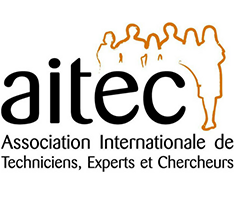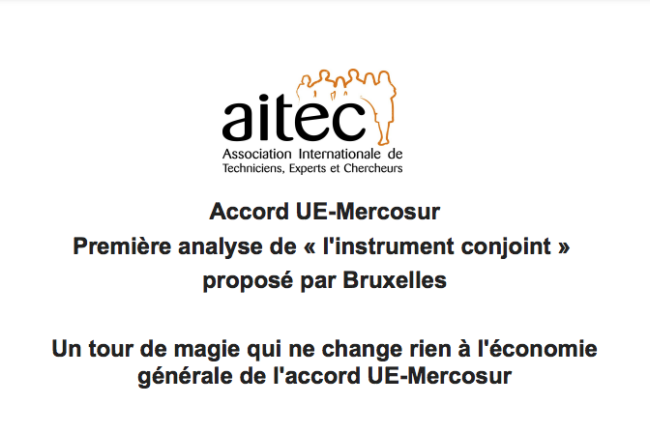Dangerous changes in GATS’ negotiating rules
Publié par AITEC, le 5 juillet 2008.
(Addressed to Trade Missions of WTO Member Countries)
As civil society organizations concerned about trade justice issues around the world, we are appalled by provisions in the draft negotiating text issued May 27th by the Chair of the WTO Council for Trade in Services.
In particular, we find the following bracketed text in paragraph 4 of the Annex to be particularly problematic :
Negotiations must be driven by the same level of ambition and political will as reflected
in the agriculture and NAMA modalities. While respecting the existing structure and principles of the GATS, Members shall respond to bilateral and plurilateral requests by offering commitments that substantially reflect current levels of market access and national treatment and provide new market access and national treatment in cases where significant trade impediments exist.
If adopted, this text would establish new mandatory procedures for service negotiations that flatly contradict many of the modalities already agreed upon for the GATS negotiations, namely :
– the Guidelines and Procedures for the Negotiations on Trade in Services [March 28, 2001] that stipulate --- “The starting point for the negotiation of specific commitments shall be the current schedules, without prejudice to the content of requests.” (point 10) and --- “Special attention shall be given to sectors and modes of supply of export interest to developing countries” ;
– the Modalities for the Special treatment of the Least Developed Country Members in the Negotiations on Trade in Services [September 3, 2003] ;
– the explicitly non-mandatory guidelines adopted in Annex C of the Hong Kong Ministerial Declaration in 2005 ;
– the flexibilities for services negotiations as outlined in Article XIX of the GATS, allowing countries to engage in progressive liberalization, and GATS Article XIX.2 which permits developing countries to open fewer sectors or liberalize fewer transactions, and to ensure that opening market access to certain sectors is compatible with their development priorities.
In effect, this bracketed text reflects a unilateral demand by the industrialized powers to make mandatory (“Negotiations must be driven”, “Members shall respond”) and binding commitments for opening the service sectors of their economies to foreign-based transnational corporations.
It is well known that the US and the EU, supported by Japan, Canada, Australia and other industrialized countries, have been insisting that developing countries make major concessions in terms of market access in services in exchange for movement in agriculture and NAMA before the Doha Round can be concluded. Key sectors of developing country economies have been targeted for market access and national treatment including --- financial services, energy services, telecom services, education services, environment services and tourism services.
Another problem is that the aforementioned bracketed text appears to be set up for bargaining against another bracketed text in the same paragraph 4 :
“Members reiterate that the next offers shall provide market access in sectors and modes of supply of export interest to developing countries, such as Modes 1 and 4, as indicated in bilateral and plurilateral requests, in accordance with Article IV of the GATS.”
The problem here is that this bracket text reiterates a long agreed principle in GATS art. VI.1. (c). It, therefore, should not be put in brackets (even if it more explicitly refers to modes 1 and 4) and should not be used for bargaining against a part of text that flatly contradicts already agreed upon negotiation principles.
We fear that in a push to rapidly finalize the Doha round negotiations in 2008, GATS negotiators will be forced to offer commitments that substantially reflect current levels of market access and much more. In some cases, developing countries will be suddenly compelled to make offers in inequitable exchanges for concessions made in areas of agriculture and NAMA. This would also mean that GATS negotiations would be extremely rushed in comparison with the negotiations on agriculture and NAMA, while the demands from the rich countries might have very complex, costly and negative consequences in many developing countries.
Moreover, many other parts of the GATS negotiations are still matters of concern, such as the negotiations on domestic regulation which will substantially erode policy space even if the language seems to have been softened.
We, therefore, urge not only developing countries but all member states of the WTO Council on Trade in Services, to reject this draft text, especially paragraph 4, and, instead, insist that the GATS modalities of non-mandatory guidelines and flexibility for developing countries, be fully respected
in these negotiations. This means that the GATS negotiations should not be rushed, and not be used as a bargaining chip or as compensation for the concessions made by developed countries’ in either the agriculture or NAMA negotiations.






